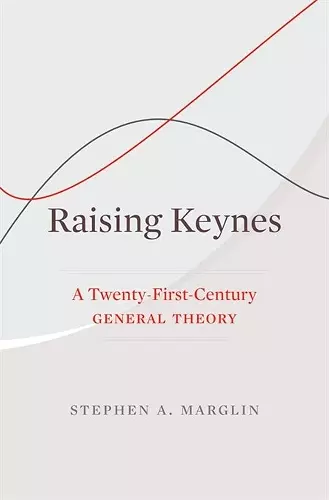Raising Keynes
A Twenty-First-Century General Theory
Format:Hardback
Publisher:Harvard University Press
Published:25th Jun '21
Should be back in stock very soon

Back to the future: a heterodox economist rewrites Keynes’s General Theory of Employment, Interest, and Money to serve as the basis for a macroeconomics for the twenty-first century.
John Maynard Keynes’s General Theory of Employment, Interest, and Money was the most influential economic idea of the twentieth century. But, argues Stephen Marglin, its radical implications were obscured by Keynes’s lack of the mathematical tools necessary to argue convincingly that the problem was the market itself, as distinct from myriad sources of friction around its margins.
Marglin fills in the theoretical gaps, revealing the deeper meaning of the General Theory. Drawing on eight decades of discussion and debate since the General Theory was published, as well as on his own research, Marglin substantiates Keynes’s intuition that there is no mechanism within a capitalist economy that ensures full employment. Even if deregulating the economy could make it more like the textbook ideal of perfect competition, this would not address the problem that Keynes identified: the potential inadequacy of aggregate demand.
Ordinary citizens have paid a steep price for the distortion of Keynes’s message. Fiscal policy has been relegated to emergencies like the Great Recession. Monetary policy has focused unduly on inflation. In both cases the underlying rationale is the false premise that in the long run at least the economy is self-regulating so that fiscal policy is unnecessary and inflation beyond a modest 2 percent serves no useful purpose.
Fleshing out Keynes’s intuition that the problem is not the warts on the body of capitalism but capitalism itself, Raising Keynes provides the foundation for a twenty-first-century macroeconomics that can both respond to crises and guide long-run policy.
Marglin has taken 80 years of neoclassical distortions of Keynes, presented them with great clarity in their own language, and then pounded them into dust, pushing the detritus back into the faces of the high priests of the neoclassical synthesis, the New Keynesians, and the New Classical Economists. Raising Keynes issues a challenge that they would be cowardly to refuse—which is not to suggest that they won’t do their best to ignore it. -- James K. Galbraith * Project Syndicate *
Stephen Marglin’s magnum opus makes a powerful case that we cannot expect the economy to solve its own problems, and that instead economists and policymakers need to put persistent unemployment at the center of their thinking in order to both better understand the economy and to make a stronger case for using fiscal and monetary policy to change it for the better. -- Jason Furman, Harvard University, former Chairman of the U.S. Council of Economic Advisers
This is a thought-stimulating reconstruction of John Maynard Keynes’s insight that market economies do not automatically gravitate to full-employment equilibrium even if prices are flexible. Stephen Marglin shows, with modern analytical tools and (yet) in an often entertaining style, how normal signal processing leads to real-time adjustments to shocks that can move a competitive economy out of equilibrium in the short run and into a different equilibrium in the long. He succeeds in demonstrating this without invoking all those frictions and imperfections so indispensable to New Keynesians. The book opens a wide array of unorthodox, but well-founded perspectives on past and current issues of economic policy. It is the fruit of life-long research, and it deserves a wide readership. -- Hans-Michael Trautwein, University of Oldenburg, Germany
Raising Keynes is a work of great significance that anyone seriously interested in how capitalism functions and malfunctions should read carefully. Stephen Marglin succeeds in clarifying the central ideas in John Maynard Keynes’s revolutionary macroeconomic framework, while also extending and deepening those ideas in important ways, applying the ideas to our contemporary conditions, and also delivering devastating critiques of orthodox macroeconomic theory and practice. The book is also highly accessible for a work of this nature, without skimping at all on technical details—an almost impossible combination to pull off. -- Robert Pollin, University of Massachusetts Amherst
ISBN: 9780674971028
Dimensions: 235mm x 156mm x 51mm
Weight: 1860g
928 pages